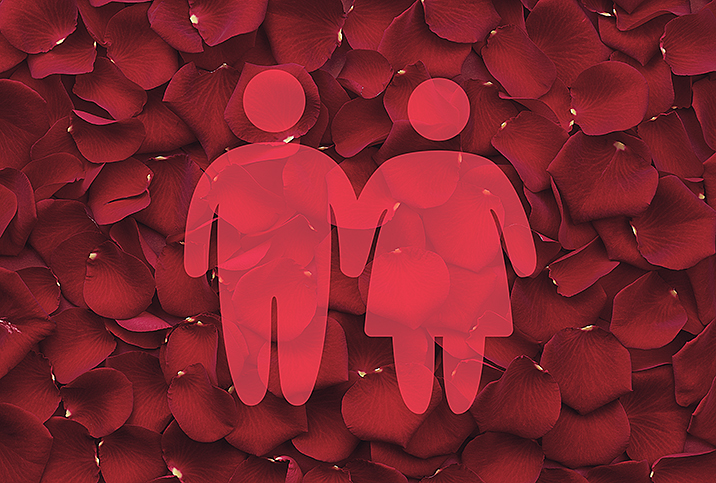The Link Between Physical and Sexual Health

Your ability to have a fulfilling sex life depends on a complex arrangement of multiple factors. The World Health Organization (WHO) defines sexual health as the state of one's physical, emotional, mental and social well-being related to sexuality. All of these aspects can fluctuate, and each is important.
For better or worse, if you have a physiological condition, it will likely impact your sex life.
Heart disease and sex
It's not uncommon for individuals with heart disease to have fear or anxiety about having sex. These feelings typically stem from the fear that having sex could trigger a heart attack. And while it's true sexual activity causes the heart rate to increase, people with stable heart conditions are usually able to have sex without any problems, according to the Mayo Clinic.
A good rule of thumb is if you're able to climb stairs or walk a mile without difficulty, you can safely have sex. Of course, if you're still concerned, you can always consult your doctor to be sure.
According to an article published by Johns Hopkins Medicine, you should abstain from sex and talk to your doctor if physical exertion causes any of the following symptoms:
- Shortness of breath
- Chest pain
- Nausea or indigestion
- Irregular heartbeat
Some heart medications can cause low libido or physical changes that make sex uncomfortable. If you experience this, seek advice from your doctor, who might be able to solve the problem by switching your medication or suggesting other strategies.
Chronic pain and sex
If you suffer from chronic pain, you likely know firsthand the condition can affect many parts of your day, including your sex life. For example, certain positions are difficult or impossible for people with tense muscles or limited mobility. For some people, experiencing pain makes focusing on and enjoying sex a difficult task.
Those who have found successful treatment for their chronic pain may find that the medications they use cause symptoms such as decreased sex drive. If this is the case for you, don’t hesitate to talk with your doctor, who may be able to adjust the dose of your medication or switch medication entirely.
If you do feel up to the task, sex can actually be helpful for chronic pain sufferers, because pleasure increases endorphins and oxytocin, hormones that make you feel good. Sex also allows you to feel connected with someone during a time you may be feeling alone.
Obesity and sex
Obesity is defined as having a body mass index (BMI) of 30 and higher and can lead to myriad health issues, including heart disease and diabetes. According to medical experts, obesity can adversely impact sexual health, as well.
Obesity can make sex more difficult due to decreased mobility and difficulty with physical exertion, and while this may not be the case for everyone, some people may shy away from sexual activity because of body image issues.
According to a study published by Harvard Health Publishing, obesity can result in lower levels of testosterone, which can affect sex drive and muscle function. Obesity has also been associated with increased risk of erectile dysfunction (ED), fertility issues in men, kidney stones and prostate cancer.
Medical experts report that maintaining a balanced diet and exercising regularly can positively affect sexual wellness.
Digestive disorders and sex
Until you've suffered from chronic intestinal conditions, you can't imagine the effect they can have on both your desire for romance and your ability to engage in sex. Two of the most common intestinal disorders are irritable bowel syndrome (IBS) and inflammatory bowel disease (IBD).
People with IBS experience abdominal pain, cramping, bloating, gas and changes to their bowel movements. Between 25 million and 45 million people in the United States, two-thirds of them women, suffer from IBS. Conversely, IBD is the umbrella term for intestinal conditions that result in chronic inflammation of the intestinal tract: The two most prevalent types are Crohn's disease and ulcerative colitis. At least 1.6 million Americans are living with IBD, the symptoms of which include diarrhea, blood in the stool, stomach pain, cramping, bloating, appetite and weight loss and anemia.
Many digestive disorder sufferers worry about experiencing a sudden flare-up during sex. Others experience pain or fatigue and aren’t even thinking of sex in the first place. Sufferers may be scared to share the truth about their condition or overthink a potential partner's reaction to an ostomy bag, in the case that their disorder was severe enough to warrant surgery. These fears may cause someone to avoid sexual activity altogether.
Men with IBD can have difficulty getting an erection and/or ejaculating and may experience hypogonadism (testosterone deficiency). To make matters worse, certain medications prescribed for the treatment of inflammatory bowel disease can lower your libido.
Medical treatments and sex
Treatments for physical and mental health issues, including depression, anxiety, chronic pain, heart disease and cancer, are known to have the potential to lower or eliminate sex drive.
Some of these treatments interfere with sexual health because of the way they affect chemicals in the body. Other treatments, such as chemotherapy or radiation therapy for cancer, can affect libido because they often cause patients to feel exhausted, nauseated and/or depressed.
Individuals' overall physical health is directly linked to their sexual health and wellness. For this reason, it's important to make healthy lifestyle choices and communicate with your doctor if any of your treatments interfere with your sexuality and quality of life.


















